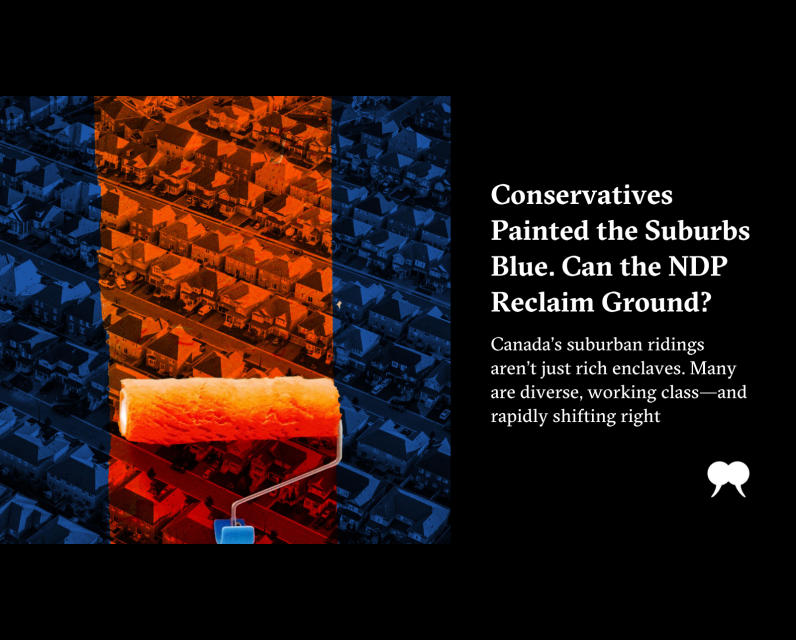Conservatives Painted the Suburbs Blue. Can the NDP Reclaim Ground?

In April, after months of polls favouring the Conservatives, Canadians unexpectedly chose the Liberal candidate, Mark Carney, to lead the country through economic turmoil. It was a close race. The Conservative Party’s share of the popular vote increased by 7.6 percentage points since the last election, securing the party twenty-five additional seats. That’s despite a leader whose Donald Trump–like style, in an election where the US president was a key factor, became a liability, costing his own seat. In turn, left-leaning parties saw considerable losses. Most notably, voters ousted the New Democratic Party and the Bloc Québécois from suburban ridings.
Aniket Kali and Jeff Allen at the University of Toronto’s School of Cities found that Conservatives made significant gains in the suburbs of Toronto and Vancouver, where they won seven of their twenty-five new seats.
But the cut is deeper. The study shows that across Canada, of the eighteen suburban seats that flipped in this year’s election, fifteen switched to a more conservative option: from the NDP and the Bloc to the Liberal Party, and from the Liberals to the Conservatives.
To be fair, the suburbs were already largely conservative. Only thirteen out of sixty-six suburban ridings in the Toronto, Montreal, and Vancouver areas had an NDP or Bloc MP, but now there are just four, and they are all around Montreal, where the Bloc is not only the left-leaning option but also the largest Quebec nationalist option, which gives it a marked advantage.
The rightward turn of the suburbs is not new. In 2018, for instance, Ontarians gave a resounding majority to Doug Ford’s Progressive Conservative Party. Ford has since won two more elections, and looking at the election map for the Greater Toronto Area, the Liberals and the NDP are consistently boxed in within the city of Toronto’s limits.
What will it take for progressive parties to win the suburbs, key to regaining prominence and power? To understand that, they must first understand how Canada’s suburbs are changing.
Alan Walks of the University of Toronto was one of the first researchers to study the shifting political attitudes in Canada’s suburbs. His research showed that political polarization between cities and suburbs became visible in the 1990s, and a clear pattern emerged by the 2000 federal election. Whether someone lives in an inner city or a suburb has a “substantial independent impact on support for parties furthest left and right” respectively, he noted.
If suburbs were mainly made up of high-income families living in large single-detached homes, with a minivan and an expensive sedan parked in the driveway, progressive parties could argue that’s not their voting base and that there’s not much they can do about it. But that’s not what suburbs look like anymore.
For more than twenty years, scholars have written about the changing face of suburbs. This extensive body of research can’t be summarized easily, but let me paint you a picture.
The city of Toronto, whose motto is “Diversity Our Strength,” has a larger white population than many of the twenty-three smaller municipalities comprising the Toronto Census Metropolitan Area. More than 80 percent of people who live in Markham and Brampton identify as a visible minority. In Ajax, Mississauga, and Richmond Hill, more than 60 percent of the population does so. In third place is a cluster of cities in the 40 and 50 percent range, including Toronto.
The inner city doesn’t stand out for its religious diversity either. In most of Toronto’s suburbs, only about half of the population identifies as Christian. Greater Vancouver shows a similar trend, with Richmond, a suburban city, housing the highest number of immigrants in the region. The city of Vancouver ranks seventh.
Richmond is that suburb full of rich Chinese people, right? Wrong. Researchers like Carlos Teixeira, Bryan Ray, and others have debunked the stereotype that mostly affluent Chinese immigrants settle in Richmond. A sizable portion of the Chinese diaspora in this area lives on low incomes and experiences housing insecurity.
In fact, poverty is part of the suburban landscape in many other regions, and not because of low-income families fleeing expensive city centres. In a recent study that looks at pathways to suburban poverty in nine Canadian metropolitan areas, University of Toronto researchers found that suburban poverty “is much more a result of staying or becoming poor within the suburbs.” Factors contributing to the impoverishment of suburbs include high rents, high transportation costs, and limited access to education, jobs, and social services.
If progressive messages are not resonating in the suburbs, it’s not because of who lives there.
What is it then?
Many blame the NDP’s leadership and bureaucracy for losses in the suburbs and beyond. These criticisms are not without merit. For instance, the lack of internal party democracy is a widely known, persistent problem. The party’s attempts to expand its voting base by adopting centrist stances are also an issue. The party either fails to convince right-leaning voters or wins elections at the provincial level only to implement policies that are not at all progressive. For example, in British Columbia and Manitoba, NDP governments have refused to fix major flaws in rent controls, instead protecting the interests of the real estate industry.
A more democratic NDP, more boldly on the left, with an unapologetic and charismatic leader like New York mayoral candidate Zohran Mamdani, could make a difference in the suburbs and elsewhere, but that wouldn’t be enough.
As David Bush of Spring Magazine warns, it is a grave mistake to place all the blame—or all the hope—on any individual or political party. He criticizes the notion that the right party, message, or leader can revive the left. “This is magical thinking that is born from political weakness and isolation.” Instead, he argues, “the class basis for new radical ideas needs to be built anew from struggle.”
What does that look like in the suburbs?
After a few years of organizing in downtown Toronto, Simran Gill (formerly Dhunna) shifted her focus to the suburbs just west of the city, where she had grown up. For the past four years, she has been involved with the Naujawan Support Network. Focused on Brampton and surrounding areas, the network brings together young people (“naujawan,” in Punjabi)—largely racialized international students and immigrants—against exploitative university and college practices and fees and abusive working conditions in industries like trucking, logistics, and construction.
The network nicely exemplifies the bottom-up rebuilding of the left that Bush and others call for.
My conversation with Gill confirmed many of my suspicions about lefty urbanites like myself. She described the downtown left as being largely reluctant to support, engage, invest time, provide funding, or expend energy in the suburbs. “Most are even reluctant to simply take transit or drive up here,” she said.
For four years, the network’s various political actions did not capture the interest or support of any party. When a student defrauded by an immigration consultant received a deportation order, the network pushed back hard by supporting an eighteen-day encampment outside the Canada Board Services Agency office; its efforts sensitized established immigrant communities with older populations, known to be important voting blocs. All parties parachuted in, and the deportations were ultimately stayed.
Expectedly, the politicians who visited the encampment—including then NDP leader Jagmeet Singh and Conservative Party leader Pierre Poilievre—used the issue at hand as a hook to present their parties’ key messages on several issues. In a matter-of-fact tone, Gill said it was hard to distinguish the NDP’s message from that of the other parties. They all talked about the rising cost of living and the need to make housing more affordable, and they promised some sort of tax cut. On approachability, she admitted that conservatives seemed to engage with folks with more ease and appeared more able to meet them where they were.
Gill shared other stories and insights, but the key lessons she left me with were about attitude and commitment. Progressives going into the suburbs, don’t pack up your bags with your old ways; leave your jargon and assumptions downtown. When you arrive, don’t jump to conclusions about who’s progressive based on your own theories, language, and political tactics. Before engaging, be aware that working-class people are very discerning about political agendas.
Listen. Be humble. Stay open to learning. And come for more than a short visit.
Can the NDP invest that much energy in the suburbs?
It has no choice. Right-wing populists thrive on short and abstract slogans. All they have to say is some version of: Life was good, then this new group of people flooded in, and the government began to take from your family to give to them; now life is hard. This statement consists of exactly 140 characters.
While right-wing politics is about “the people” in the abstract and individual pocketbooks, left-wing politics is about what lies between: class politics.
Left politics is about distinguishing between what is “good for the economy” or “in national interest” and what truly benefits low-income communities and working people. It is about crafting language to articulate the experiences of the people capitalism systematically neglects and actively exploits. It’s about devising strategies to protect social movements from elites and politicians who act on their behalf and don’t hesitate to send in the police to silence dissent. It is about dreaming up an alternative world view, then collectively determining how to get there.
It’s hard to do that through social media posts.
Organizing Canadian suburbs along progressive values and goals is a colossal task, but it has been done before, and the effort doesn’t have to start from scratch.
The Co-operative Commonwealth Federation, or CCF, which later became one of the founding groups of the NDP, is one of many examples of left-wing parties rooted in broad-based organizing across a large territory. While its most well-known achievement was pioneering Canada’s universal health care, the CCF promoted socialist values and ideas that inspired many other policies and programs; to this day, they set Canada apart from its southern neighbour.
Another famous example is Brazil’s Partido dos Trabalhadores, or PT. For centuries, all political parties in Brazil represented different segments of the economic elite. The PT broke away from this tradition, unambiguously standing for the social movements and labour unions that formed it. The PT first won a federal election in 2003, and the percentage of Brazilians living in extreme poverty was halved over the next four years.
There are many other examples the Canadian left can draw lessons from.
A left-leaning party determined to make inroads in the suburbs could invest in building relationships with the Naujawan Support Network and similar groups across the country that have been forging ahead despite neglect from political parties. Actively and genuinely engaged, these groups could serve as the foundation for something new.
The old is dying, and the new can be born. In the suburbs, of all places.
The post Conservatives Painted the Suburbs Blue. Can the NDP Reclaim Ground? first appeared on The Walrus.


Comments
Be the first to comment